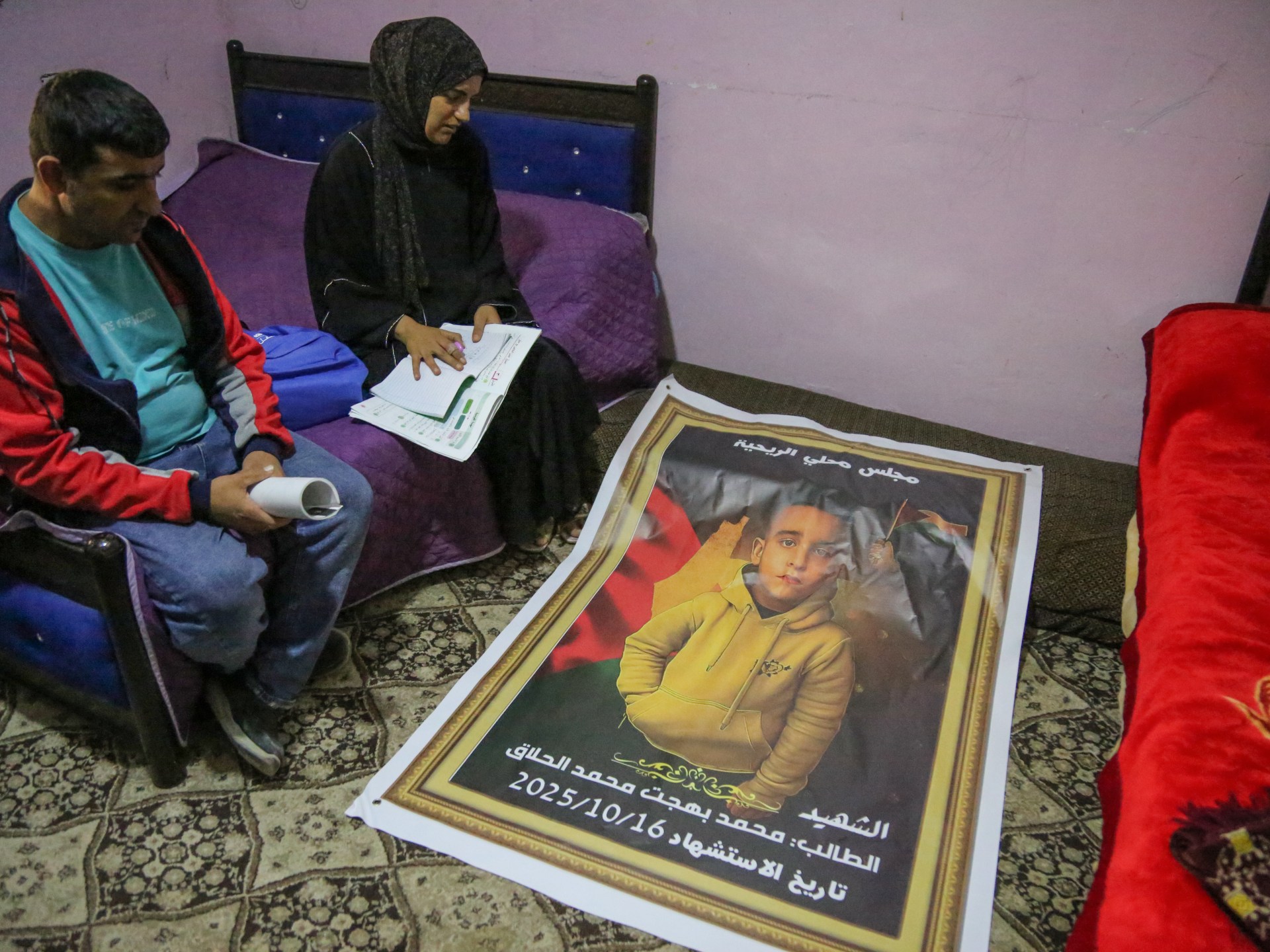Al-Rihiya, Occupied West Bank – Nine years old on the morning of October 16 Muhammad al-Hallaq Another day dawned in his small village south of Hebron.
His mother Alia prepared his clothes and breakfast and packed three extra slices of pizza to share with his friends, as he had asked.
Recommended stories
3 List of itemsEnd of list
Muhammad came back from school with a new backpack and kept his books and notepads in it, eager to take it to school at the end of the week. He ate a little and then went off to watch the birds as he liked.
A child, excited by simple things and curious about the world around him.
Muhammad came home, messed around with some olives, and then went out to play football again. This time, the fourth grader did not return.

‘Muhammad was gone’
Alia received a phone call in the grocery store.
“My uncle Ahmed was calling, asking if there had been any clashes (with Israeli forces) in our area,” she said. “I screamed unconsciously. ‘My son Muhammad, my son Muhammad!’ Don’t know why, but mother’s instincts are always right.”
Muhammed’s older sister, 14-year-old Mais, heard gunshots in the evening and ran outside.
Both Mais and Alia were originally told that their son was injured.
Alia went to the local hospital and was told that her son had been shot.
“They said he is fine and they will take the pill,” Alia said. But then she heard whispers that his pulse had stopped. She wanted to see Muhammad, but was not allowed in the operating theatre, as surgeons desperately tried to save the boy’s life.
Then Alia heard a long, piercing beep from the heart monitor. Muhammad was dead, killed by Israeli forces operating in his village.
“Muhammad was gone,” Alia said. “And with him, everything is better.”

lethal force
Commenting on the killing of Muhammad by Israeli forces, the UN Human Rights Office in the Occupied Palestinian Territory said it was “horrified”. The UN office added that Mohammed was the 1,001st Palestinian to be killed by Israeli forces or settlers. occupied the West Bank As of October 7, 2023, with 213 children.
The United Nations said the youngest child killed by Israeli forces in the West Bank was two-year-old Laila Khatib, who was shot in her home in Jenin in January during an Israeli raid.
“International standards require Israel to ensure independent and effective investigations into all incidents where individuals are killed in violent or suspicious circumstances,” the UN office said. “The large number of Palestinians killed during this period, the illegal use of force, the enabling and support of settler violence, and the local impunity for crimes committed against Palestinians, all suggest that the Israeli (army) uses lethal and potentially lethal force as a tool to control and oppress Palestinians, rather than to restore the lives of Palestinian citizens and maintain public order.
Muhammad and his friends are believed to have fled when they saw Israeli military vehicles in their vicinity before Israeli soldiers opened fire.
An initial statement from the Israeli military said its troops were responding to suspected stone-throwing — although no local reports indicated that or whether Muhammad and his friends were involved. Israeli media have since reported that a preliminary military investigation found that the firing “deviated from the rules of engagement”, and resulted in “improper use of weapons”.

‘a great void’
Israeli soldiers rarely face consequences for killing Palestinians in the West Bank, leaving towns and villages like al-Rihiya to pick up the pieces after tragedies like Muhammad’s death.
He was the third of five siblings – Mais, the eldest, Jaddi, who is 12, Silas, six, and Elias, four.
Muhammad’s absence is heartbreaking for all of them.
The white robe he wore for Friday prayers is still neatly folded next to his bed, next to a small bottle of perfume. His books are kept where he left them.
“This is where Muhammad slept,” Alia said, pointing to the empty space. “They killed his childhood.”
His family struggles to deal with Muhammad’s death in their own way. Cila refuses to go back to school – her brother always walks with her.
Mais said she collapsed when she heard Muhammad had died.
“Muhammad was not just a brother, he was my friend,” she said. “When he came home from school he would ask me to teach him, and if I was busy he would get angry and say ‘teach me first’. I was afraid to sleep in the dark, so he would stay with me until I fell asleep, then he would go to bed.”
The bag Muhammad received on his last day of school still hangs on a nail near his bed.
His father, Bahajat, finds himself walking out of the bag and around the room, touching his bed, breathing in the scent of his clothes.
“His departure left a huge void,” Bahajat said. “I see him in every corner of the house: at the dining table, in his study and in the playground.”
“I still can’t believe he’s gone,” Mies said. “I imagine him in heaven playing, laughing and having the same fun as ever. I still can’t believe he’s gone … and I never will.”

